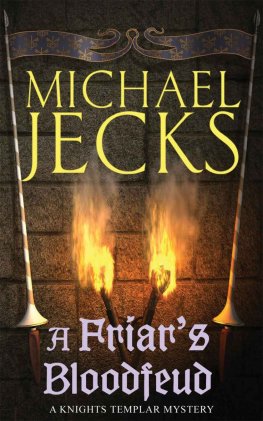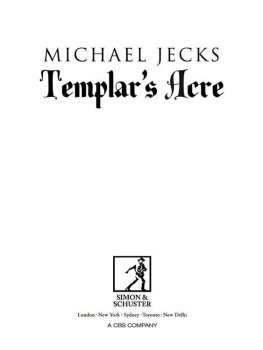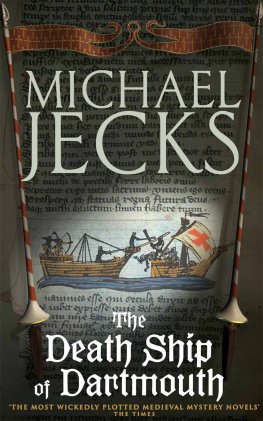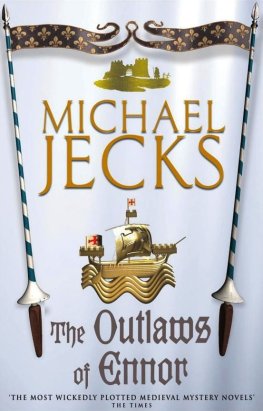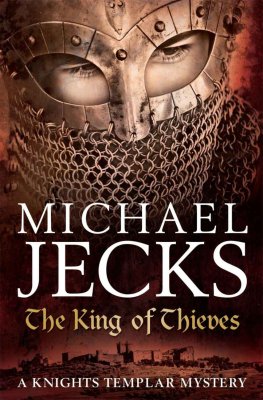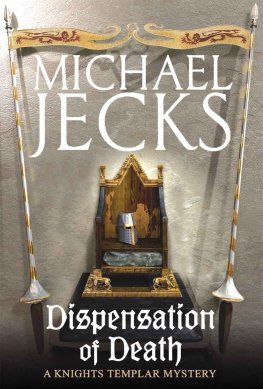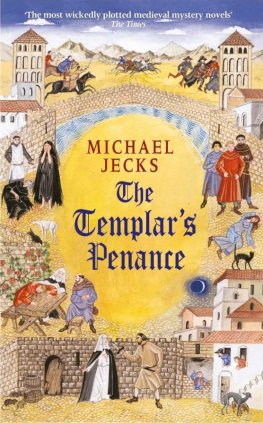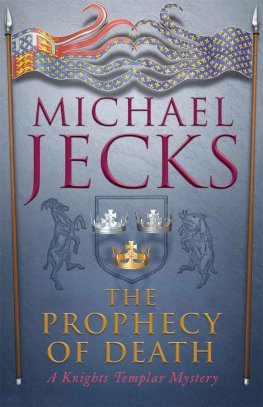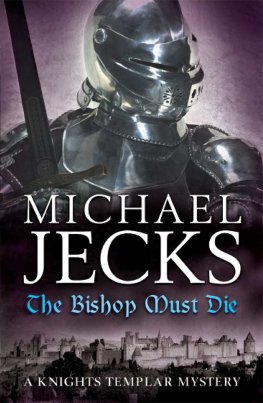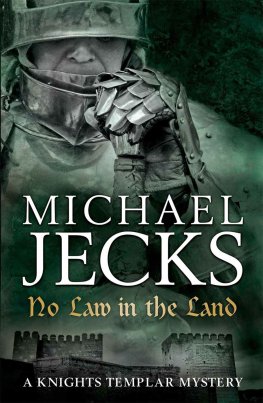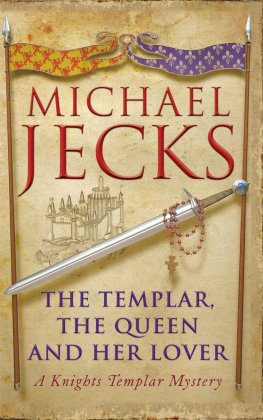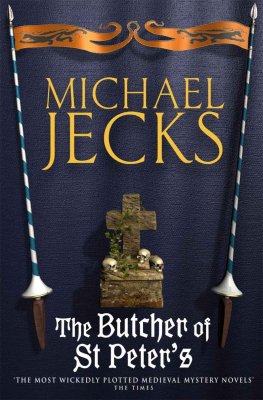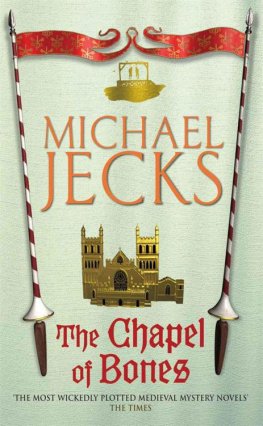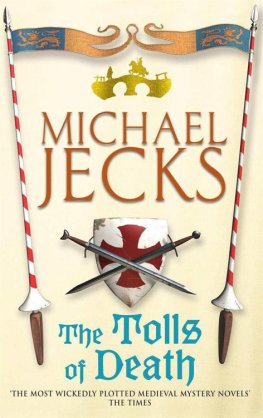Michael Jecks - A Friar's bloodfeud
Here you can read online Michael Jecks - A Friar's bloodfeud full text of the book (entire story) in english for free. Download pdf and epub, get meaning, cover and reviews about this ebook. year: 2014, publisher: Headline, genre: Detective and thriller. Description of the work, (preface) as well as reviews are available. Best literature library LitArk.com created for fans of good reading and offers a wide selection of genres:
Romance novel
Science fiction
Adventure
Detective
Science
History
Home and family
Prose
Art
Politics
Computer
Non-fiction
Religion
Business
Children
Humor
Choose a favorite category and find really read worthwhile books. Enjoy immersion in the world of imagination, feel the emotions of the characters or learn something new for yourself, make an fascinating discovery.
- Book:A Friar's bloodfeud
- Author:
- Publisher:Headline
- Genre:
- Year:2014
- ISBN:9781472219817
- Rating:4 / 5
- Favourites:Add to favourites
- Your mark:
- 80
- 1
- 2
- 3
- 4
- 5
A Friar's bloodfeud: summary, description and annotation
We offer to read an annotation, description, summary or preface (depends on what the author of the book "A Friar's bloodfeud" wrote himself). If you haven't found the necessary information about the book — write in the comments, we will try to find it.
A Friar's bloodfeud — read online for free the complete book (whole text) full work
Below is the text of the book, divided by pages. System saving the place of the last page read, allows you to conveniently read the book "A Friar's bloodfeud" online for free, without having to search again every time where you left off. Put a bookmark, and you can go to the page where you finished reading at any time.
Font size:
Interval:
Bookmark:
Michael Jecks
A Friar's Bloodfeud
Chapter One
Simon Puttock, bailiff to the Keeper of the port of Dartmouth, sat alone in his chamber listening to the wind howling about the houses. Shivering, he sipped his spiced wine with a feeling of unfocused anxiety, thinking of death.
In part perhaps it was his loneliness. His wife and family were still in Lydford, almost a days journey across Dartmoor, and he missed them all dreadfully; the weather only served to add to his sense of trepidation and dislocation.
There was a storm blowing in from the south, and every gust made the shutters rattle alarmingly, while rain and hail splattered loudly against them. Indoors the tapestries and hangings rustled and shivered as though being shaken by demons who mocked him from the darker recesses of the room. Outside there was a wild shrieking and thrumming from the rigging of the ships, a sound he would never grow accustomed to. It was too much like insane creatures screaming and gibbering.
Such thoughts would never have occurred to a man such as Sir Baldwin de Furnshill. Simon knew himself to be less worldly than his friend, who often laughed at Simons nervousness about passing certain places of ill-fame and his cautiousness regarding old wives tales Baldwin called them superstitious drivel. Only a child could believe such rubbish, he had once said contemptuously when Simon had told him the story of the Grey Wethers.
The tone of his voice had shown Simon how comprehensively Baldwin rejected such old moor legends, but it was different for him. Baldwin had been bred up in the gentle, soft lands north-east of Crediton; Simon had been born on the moors, and a moorman was always more aware of their history and atmosphere than foreigners. Simon could feel the mood of the moors in his bones. As he grew older, he found that he was ever more attuned to the brooding nature of their spirit.
It was that which tonight made him start and shoot a glance over his shoulder, then round at the blacker corners. There was a sense of foreboding which he couldnt shake off, no matter how hard he tried. He felt sure that it must be something to do with the passing year, the terrible things he had witnessed: the murders in Exeter, Baldwins own near-death, and the despair of so many people at their bereavement; and he looked forward with hope to a new year that would be happier for all.
If he had realised what was to come, he would have been less keen to see the old year pass by. Yet at the outset that was his only hope: that the events of 1323 would soon fade in his memory and the new year would dawn bright and full of hope.
He was to be disappointed. The year of our Lord 1324 held only more horror and misery. And of all the grim events of those months, it was the first, the loss of his servant Hugh, that was to cause him the most despair.
She whimpered as she heard the man approach. He brought with him a rattling, slow little handcart, laden as before. He didnt need it: she knew as well as he did that she was ruined already. There was nothing more he could do that could increase her terror.
It was a cold room. No matter how hot he made the fire, the warmth failed to reach her. She knew only the damp, the feeling of freezing stone underfoot, the rank smell of rottenness from soggy sacking. It was odd how she felt the chill and moisture, while all the time her nostrils told her that the air was filled with the foul exhalation of flames and heated steel.
A place dedicated to destruction, this. She knew what had happened in such chambers: Christ Jesus, all knew what went on. When the rich and powerful desired something, people were brought here screaming and begging for mercy; later, much later, if they were lucky, they were pulled hence not too badly broken. The still more fortunate were never seen again. Many died while their torturers tried to wring the last sensation of agony from their bodies.
She was not ready for this. She had made prayers to Holy Mother Mary, pleading that she might be saved, but nothing had happened neither an increase in her courage nor the blessed relief of death to save her from what she knew must be coming.
The man himself had nothing about him to tell what sort of evil lurked within him. Just an ordinary countryman, a little older than most, he stood now beside the little cart piled with its steel tools, the heavier devices collected about the outside like a smiths ranged around his anvil, and looked at her with his unfathomable eyes.
She wondered what colour those eyes would be in daylight. Here they looked simply empty, as though the cell absorbed all colour from him, just as it had sucked away the kindness and compassion. Nothing was left but an enquiring calculation. And she must stand with her arms shackled high over her head, terrified, while he contemplated her like a butcher eyeing a fresh steer.
They wanted her money. All she had in the world was her little manor, and now this murderer was going to take it from her and leave her destitute. She could try to hold back for as long as she might, but in the end he would have it. He would flay her, break all the bones in her limbs, burn her naked flesh. Just as had been done to poor Lady Baret.
He wore a stained and worn linen shirt, and now he drew a smiths apron over his head. It was thick ox-hide, a good shield against fires and burns, and she watched with tense, draining horror as he pulled a long brand from his cart, and set it to lie with its end among the coals.
While it rested there, he eyed her, his face lighted by the orange glow of the fire, making all the creases and wrinkles stand out like the devils. It gave him the appearance of total evil. Her heart was frozen with fear, and she felt certain that he could sense her dread. And then she became aware of something else. Although it was a dark and gloomy room, she saw a smile break out on his features.
Then he turned away and bent over the fire, and when he faced her again he held the brand pointing towards her.
Lady Lucy of Meeth shrieked as the heat approached her breast, but even as she begged and pleaded for mercy she could see that there was still nothing in his eyes: no lust, no triumph just a boundless emptiness as though she was nothing, less even than an ant in his path.
Her last thought was, This man has no soul and then the steel entered her breast and she knew nothing more.
Perkin! Perkin! Throw it here, here here, you son of a goat!
Rannulf, run!
Beorn! Beorn!
The men slipped and slid in the chill mud, legs already beslobbered, hosen frayed where thorns had ripped, shirts torn where hands had grabbed, and two already bloodied about their faces.
A man was in front of Perkin. He rammed a hand out, catching the fellow above the eye, and thrust him away. Then everyone was converging on him, and he could see the top of one fair head, a darkly bearded face grimacing in determination, a fist, an arm gripped by two hands, a shred of torn shirt and all the while the rushing of blood in his ears, the screeching of men in battle, the slap of bare feet in the freezing mud, the damp splashing of puddles, the panting, the grunting, the groaning
Theyd started in the middle of the pasture between the two vills, twelve men and six women from Monkleigh, fourteen men and nine women from Iddesleigh, with a nervous-looking reeve from Monk Oakhampton between them. He looked little more than two and twenty, and his pale hazel eyes flitted from one face to another as he handled the ball. Then, when he felt he could take the tension no longer, hed reached right down, and then hurled the bladder up as high as he could, immediately bolting from between the two sides.
There had been a moments silence. All eyes were on the ball, slowing as it rose, spinning gently in the clear, cold air. It was heavy, a pigs bladder stuffed full of dried peas, stitched tightly, slippery to the hand. But as it started to fall, both sides had rushed forward to grab it.
Font size:
Interval:
Bookmark:
Similar books «A Friar's bloodfeud»
Look at similar books to A Friar's bloodfeud. We have selected literature similar in name and meaning in the hope of providing readers with more options to find new, interesting, not yet read works.
Discussion, reviews of the book A Friar's bloodfeud and just readers' own opinions. Leave your comments, write what you think about the work, its meaning or the main characters. Specify what exactly you liked and what you didn't like, and why you think so.

